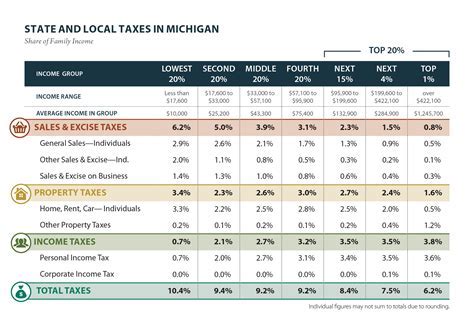Salary Tax Calculator Michigan

In Michigan, understanding how your salary is taxed is crucial for effective financial planning. The state’s tax system is relatively straightforward, but it’s important to consider both federal and state taxes, as well as other deductions that may apply. Below, we’ll break down the key components of salary taxation in Michigan, provide a step-by-step guide to calculating your take-home pay, and offer insights into maximizing your earnings.
Understanding Michigan’s Tax Structure
1. State Income Tax
Michigan has a flat state income tax rate of 4.25% as of 2023. This means that regardless of your income level, you’ll pay the same percentage of your taxable income to the state. Unlike some states with progressive tax systems, Michigan’s flat rate simplifies calculations but may disproportionately affect lower-income earners.
2. Federal Income Tax
Federal income tax is progressive, with rates ranging from 10% to 37% in 2023, depending on your taxable income and filing status. Michigan residents must account for federal taxes in addition to state taxes.
3. Payroll Taxes
All employees are subject to FICA taxes, which include: - Social Security Tax (6.2%) on the first 160,200 of earnings (2023 limit). - Medicare Tax (1.45%) on all earnings, with an Additional Medicare Tax (0.9%) for individuals earning over 200,000 ($250,000 for married couples filing jointly).
4. Other Deductions
Common deductions from your gross salary include: - Federal and State Tax Withholdings - Health Insurance Premiums - Retirement Contributions (e.g., 401(k)) - Voluntary Deductions (e.g., life insurance, HSA)
Step-by-Step Salary Tax Calculation in Michigan
To calculate your take-home pay in Michigan, follow these steps:
Step 1: Determine Your Gross Income
Start with your annual salary or hourly wage. For example, if you earn $60,000 annually, this is your gross income.
Step 2: Calculate Federal Tax Withholding
Use the IRS tax brackets and withholding tables based on your filing status (single, married, etc.). For a $60,000 salary, the federal tax might be approximately $9,000 (15% marginal rate).
Step 3: Calculate Michigan State Tax
Apply the 4.25% flat rate to your taxable income. For $60,000, the state tax would be $2,550.
Step 4: Deduct Payroll Taxes
Calculate FICA taxes: 6.2% for Social Security ($3,720) and 1.45% for Medicare ($870). Total payroll taxes: $4,590.
Step 5: Account for Other Deductions
Subtract other deductions like health insurance, retirement contributions, and voluntary deductions. Assume $5,000 for these.
Step 6: Calculate Net Pay
Subtract all deductions from your gross income:
$60,000 - $9,000 (federal) - $2,550 (state) - $4,590 (FICA) - $5,000 (other) = $38,860 annual net pay.
Maximizing Your Take-Home Pay in Michigan
Strategic financial planning can help reduce your tax burden and increase your net income. Consider the following:
- Retirement Contributions: Contribute to tax-advantaged accounts like a 401(k) or IRA to lower taxable income.
- Health Savings Accounts (HSAs): HSAs offer triple tax benefits—contributions are tax-deductible, grow tax-free, and can be withdrawn tax-free for qualified medical expenses.
- Tax Credits: Explore federal and state tax credits, such as the Child Tax Credit or Michigan’s Homestead Property Tax Credit.
- Flexible Spending Accounts (FSAs): Use FSAs to pay for eligible expenses with pre-tax dollars.
Comparative Analysis: Michigan vs. Other States
| State | Income Tax Rate | Key Notes |
|---|---|---|
| Michigan | 4.25% (flat) | No local income tax; relatively low state tax rate. |
| California | 1% - 13.3% (progressive) | Highest state income tax rate in the U.S. |
| Texas | 0% (no state income tax) | Higher sales and property taxes to compensate. |

Future Trends in Michigan Taxation
Michigan’s tax landscape is evolving. Recent discussions include: - Potential Tax Rate Changes: Proposals to adjust the flat tax rate or introduce a graduated system. - Expansion of Tax Credits: Efforts to increase accessibility to credits for low-income families. - Digital Economy Taxation: New laws to tax digital goods and services more effectively.
FAQ Section
What is Michigan's state income tax rate?
+Michigan has a flat state income tax rate of 4.25%.
Are there local income taxes in Michigan?
+No, Michigan does not impose local income taxes.
How can I reduce my taxable income in Michigan?
+Contribute to retirement accounts, HSAs, and take advantage of tax credits and deductions.
What is the Social Security tax limit for 2023?
+The Social Security tax applies to the first $160,200 of earnings in 2023.
Does Michigan tax retirement income?
+Yes, Michigan taxes most retirement income, including pensions and 401(k) distributions, at the 4.25% rate.
Conclusion
Calculating your salary tax in Michigan involves understanding both state and federal tax obligations, as well as other deductions. By leveraging tax-advantaged accounts and credits, you can optimize your take-home pay. Stay informed about potential tax law changes to make the most of your earnings in the Great Lakes State.